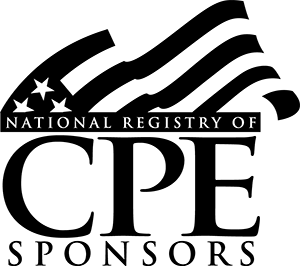What Sponsors Need to Know
WHAT ARE THE REQUIREMENTS OF PROGRAM KNOWLEDGE LEVELS IN PROMOTIONAL MATERIALS?
The Statement on Standards for Continuing Professional Education (CPE) Programs (Standards) specifies five program levels: basic, intermediate, advanced, update and overview. Properly assigned program knowledge levels allow the participant to determine if he or she has the appropriate background to take the course. Let’s review the definitions of the specific program levels covered in the Standards.
Basic – Program knowledge level most beneficial to CPAs new to a skill or an attribute. These individuals are often at the staff or entry level in organizations, although such programs may also benefit a seasoned professional with limited exposure to the area.
Intermediate – Program knowledge level that builds on a basic program, most appropriate for CPAs with detailed knowledge in an area. Such persons are often at a mid-level within the organization, with operational or supervisory responsibilities, or both.
Advanced – Program knowledge level most useful for individuals with mastery of the particular topic. This level focuses on the development of in-depth knowledge, a variety of skills, or a broader range of applications. Advanced level programs are often appropriate for seasoned professionals within organizations; however, they may also be beneficial for other professionals with specialized knowledge in a subject area.
Overview – Program knowledge level that provides a general review of a subject area from a broad perspective. These programs may be appropriate for professionals at all organizational levels.
Update – Program knowledge level that provides a general review of new developments. This level is for participants with a background in the subject area who desire to keep current.
All programs identified as intermediate, advanced or update must clearly identify prerequisite education, experience, and advanced preparation in precise language so that potential participants can readily ascertain whether they qualify for the program. For courses with a program knowledge level of basic and overview, prerequisite education or experience and advanced preparation must be noted, if any, otherwise, state "none" in course announcement or descriptive materials (promotional material.)
Sponsors are often challenged in developing effective prerequisites. Let’s take a look at two examples to distinguish between a weak prerequisite and a more effective one.
Example 1 (weak)
“You must be a college graduate to take this training program.”
Why is this a weak prerequisite? First, all licensed Certified Public Accountants (CPAs) are college graduates. Second, “college graduate” is vague. Do you want the graduate to have a specific course concentration such as business or accounting? Do you want the graduate to have a certain major? If so, this should be clearly stated in the prerequisite.
Example 2 (effective)
“Participants must have 3 years of experience at the supervisory or above level in reviewing transactions processed through the accounting ledger.”
This is an effective prerequisite because it is specific. The sponsor clearly identified 3 years of experience at a certain level (supervisory or above) in a certain area or function.
Sponsors should make every attempt to equate program content and level with the backgrounds of the intended participant. Properly assigning the program knowledge level and identifying the exact prerequisite education and experience levels allow sponsors to meet this requirement.

